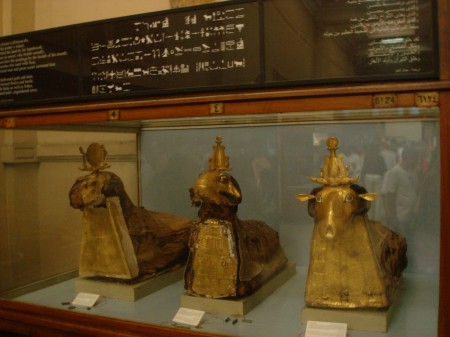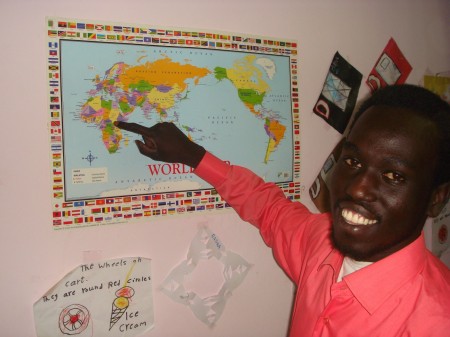Well, I’ve made it back home to Jordan, and I can finally start working on polishing up these blog entries and eventually hoping that they’ll be good enough to make public, someday. The house looks good; I think it was cleaned at some point during my absence. That’s one of the many advantages of having a housemate again after a year of living alone; someone with a keener, more critical eye than my own that can look around say “this place is a STY.”
Yesterday, for my last day in Egypt, I played it pretty close to home again. I spent the morning taking a second tour of the Egyptian Museum again, getting there as early as possible so I could try to see everything without feeling rushed. I clung to the hope that perhaps I would be allowed to photograph if I came in at “just the right time;” I’d read in WikiTravel that if you asked, you could take photos without flash from 9 AM through noon. Unfortunately, this turned out to be untrue, so I contented myself with wandering the massive warehouse of antiquities again and trying to get as many mental pictures as I could.
This time, I found the “mummified animals of Egypt” exhibit on the second floor. Two rooms filled with shelves of shriveled animal mummies or “faux mummies,” or dummies stuffed with straw or a piece of an animal that the poorer Egyptians would have used in place of a true sacrifice. One entire wall was taken up with the massive corpses of two crocodile mummies, deified by the ancients, as well as one of the numerous Apis Bull mummies that had a shrine and burial chamber of their own. The sign described the mummification process of the bulls as “an enema of turpentine and acids that was introduced rectally to the animal.” Geez, and if this is how they treat their deities…

As I'm from a sheep/goat farm, I couldn't resist stamping a forbidden photo of some of Egypt's gold-plated sacrificial rams
I watched the time closely, because I had something special planned for that evening. I didn’t mention it in last week’s blog post, but as I was riding the metro back to the hostel from the train station after my return from Alexandria, I met a Sudanese pastor. He offered me the seat next to him, and as I sat down gratefully with my heavy luggage, he introduced himself as Pastor Isaac. I hadn’t been expecting to meet a pastor, especially not one that spoke English. He explained that he was a minister for the Sudanese refugee camps near Hadayek al-Maadi. He gave me his business card, and before Haitham and I hurried to the train later that evening to get to Luxor, I had the time to quickly jot out an email to him asking what his church was doing for Easter Sunday. His reply was that they had a service on Sunday night in Arabic, but with an English translator.
I met Isaac outside the subway station in Hadayek al-Maadi just after the sun went down. He was wearing a silver-gray suit and embraced me happily. We chatted as he led me through the unpaved streets, lanterns glowing in the windows around us. He told me that this was a Sudanese children’s school we were going to, and that his actual church was somewhere else in the city. He paused in his explanation to shout angrily at a teenager on a scooter that roared past us, almost knocking me over, then calmly adjusted his tie and directed me to turn left down a small side street, where a tall young African welcomed us into a bright little parlor office.
The young man introduced himself as Tony, the principal of the children’s school, and he and I talked a little bit about the conflict in Sudan while Isaac left to go and prepare the next room for the church service. A group of people were just leaving from it, and Tony explained to me that on a night as important as Easter, they actually had 3-4 services in a row with as many congregations!

Tony points to the city of Juba, South Sudan - what is hoped to be the future capitol of the new Christian nation
The next two hours were filled with dancing, preaching, and song. Isaac led me proudly over to a chair in the very front row, and asked me to get up and tell the congregation a little bit about myself and how I found myself in Egypt. The translator, Augustine, didn’t seem to have any problems switching between translating my English into Arabic and the pastor’s Arabic into English. I told them about my work in Jordan with refugees and how the plights were similar, though the religion differed. Isaac stood up with tears in his eyes and said “thank you for coming to Cairo, brother!” In the second video below, Isaac leads a sermon, filled with a lot of the phrase, “al-Meseeh qam!” which means, “The Messiah is risen!” And although I didn’t get it in the video, the congregation responds, “Bal-haqeeq, qam!” which roughly translates, of course, to “He has risen, indeed!”
Near the end of the service, as one of the deacons was giving rapid announcements to the congregation, a little girl separated from her mother and crawled up onto the chair next to me, gazing at me with wide eyes. She couldn’t have been more than 4 or 5 years old. I got out my pen and drew a cross on my hand. She stared at my hand, then at her own, and then reached out determinedly and started to scrub away at my palm. She would look at her own skin, as if measuring the proper tone, and then in confusion at my own. After a half minute of that, she settled for just treating my palm like a pad of paper and decided to fill it in with the black ink from my pen.
After the service, a little boy appeared in the doorway carrying a tray filled with old-fashioned glass bottles of Pepsi and Mountain Dew, and the congregation passed them around as they sat and talked to each other. I asked Isaac and Augustine how many members of the congregation weren’t regular Arabic speakers, so that they needed to use translation. Isaac looked surprised. “Oh no, Zach, they all speak Arabic fine. I brought Augustine up to translate just for you!” I want to say that I was amazed that they had gone through all that trouble for me, but after all the kindness they’d already shown me, I merely matched Augustine’s firm handshake with one of my own and thanked him solemnly for his kind service.
Tony waved us goodbye from the door of his school as Isaac walked me back to the subway station. He reached into his pocket and pulled out a subway token for me. “In case you need one to get back, brother!” As always, the kindness of people who have so little never ceases to amaze me. I thanked him for his offer, but showed him that I had already purchased my return ticket before I had come down. He hugged me again, and I went through the turnstile. The Arab guard on the other side stared narrow-eyed at the tall, jet-black man waving me goodbye and asked me, “What did that Sudani want? Was he bothering you?” I drew myself up and looked down my nose at the little man. “That ‘Sudani’ is a friend of mine and was saying goodbye to me.”
This morning was preoccupied with packing and trying to fit everything back into my suitcase again after being strewn about the floor for many days. The Canadian Hostel, to thank me for my days of patronage, had procured a taxi for me to the airport, free of charge. They made a conservative estimate on the length of time it would take to get through Cairo morning traffic, but it only took 20 minutes. That could have had something to do with the fact that my driver was a typical driver in the sense that he shucked and weaved throughout the traffic like a maniac and I just did my best to focus on my breakfast tami’yah and try to block out what was going on around me in the streets or how many old ladies we’d just run over.
My flight back to Amman was shared with a good-natured Circassian, a native Jordanian who had emigrated to America many years ago but was back in the Middle East to visit some family. Shigam explained to me with amusement how Arabs were always unfailingly shocked at his perfect usage of Arabic…at least until they discovered he was a Circassian and not a “Westerner”. As he and I sipped complimentary beers (he had charmed free beer for us from of the Eastern-European flight attendant women with his knowledge of Russian and Czech) he explained that Amman was actually originally founded by Circassians, who then later helped the first rulers of Jordan move to the area. In return, Shigam told me that Circassian families had always enjoyed great power and prestige in the Hashemi government of Jordan, serving as trustworthy treasurers and guards of the highest rank. “The kings here; they don’t even trust their own people with money and state secrets so they just have us take care of things,” he laughed. Even after the plane touched down and I had retrieved my luggage, he offered to take me back to Amman in his taxi, which I gratefully accepted.
And now, as it’s getting dark and the familiar Call to Prayer is sounding the sunset sulaah, it’s time for me to wrap up this entry and finally get some sleep!


What a beautiful way to celebrate Easter! I loved the singing in the first video, and especially the complicated rhythm of the hand claps! Did I hear some sort of instrumental accompaniment in there as well? That appeared to be a men’s choir — was there congregational singing too, and in Arabic?
From the 2nd video, it seems obvious (in retrospect) that Augustine is talking mainly to you. What a generous thing to do!
Very much enjoyed reading of your adventures –it seems that you really made the most of your visit to Egypt!